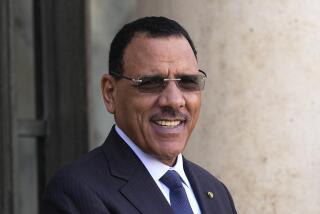New Nigeria Chief Frees Pro-Democracy Activists : Africa: A general strike over the interim leader’s installation worsens fuel shortages, further crippling the nation’s largest city.
- Share via
LAGOS, Nigeria — The head of Nigeria’s in terim government, Ernest Shonekan, ordered the immediate release Sunday of pro-democracy leaders detained since July.
A general strike called by unions over the military’s installation of Shonekan meanwhile worsened a fuel shortage and further crippled this city, Nigeria’s largest.
The release of the three leaders was Shonekan’s first major action since he took over Thursday as interim leader in place of former military President Ibrahim Babangida, who annulled Nigeria’s presidential election in June.
“Beko, Gani and Falana should be released unconditionally and immediately,” Shonekan said in an official statement in Abuja, the capital. “Their unconditional release is based on humanitarian grounds,” he added.
Campaign for Democracy leaders Beko Ransome-Kuti, Gani Fawehinmi and Femi Falana were detained in Abuja after leading the first of a series of mass protests against the annulment of the June election.
Businessman Moshood K. O. Abiola is widely considered the winner of the annulled balloting.
The official statement said Shonekan gave the release order after the three men met him in his office in Abuja.
Spokesman Sola Atere said Shonekan also ordered the release of journalists detained over the June 12 election. At least five journalists were detained over stories critical of the election’s annulment.
Shonekan, previously head of a transitional Cabinet, was sworn in as head of government to stay for six months, conduct a fresh election and hand over power by March 31, 1994.
In Lagos, public utilities like water and electricity appeared to be still operating, but the fuel shortage that has plagued oil-producing Nigeria for about a year worsened.
People lined up for hours at gas stations. Drivers jostled and yelled in the scramble for fuel, and there were frequent fistfights among motorists.
“I have been here since yesterday morning,” said Dike Azubike, his car in the middle of a quarter-mile-long line in the suburb of Ikeja.
The strike, called by the 3.5-million-strong Nigerian Labor Congress, an umbrella grouping of 41 unions, began Saturday at the same time as that by the 50,000-strong National Union of Petroleum and Natural Gas Workers. The job actions are aimed at forcing the transfer of power to Abiola.
Atere told the Reuters news agency: “I can’t say that the impact of the strike so far is that wide. It seems it is more in Lagos and Ibadan.”
Assessing the impact of the strike has been difficult because of a three-day holiday. “If workers don’t turn up for work Tuesday, then it will tell us the impact is greater,” Atere said.
Aviation officials said a few local flights operated by private airlines flew from Lagos Sunday. British Airways planned to operate its flight Sunday night as scheduled, its West African manager, Andy Geary-Stevens, said.
More to Read
Sign up for Essential California
The most important California stories and recommendations in your inbox every morning.
You may occasionally receive promotional content from the Los Angeles Times.












